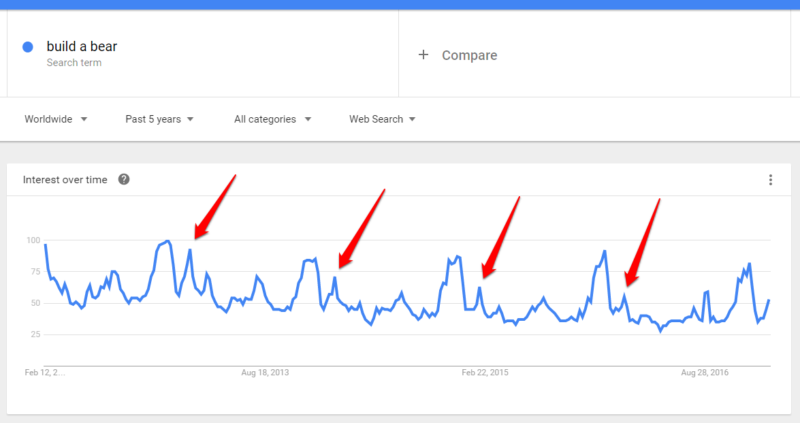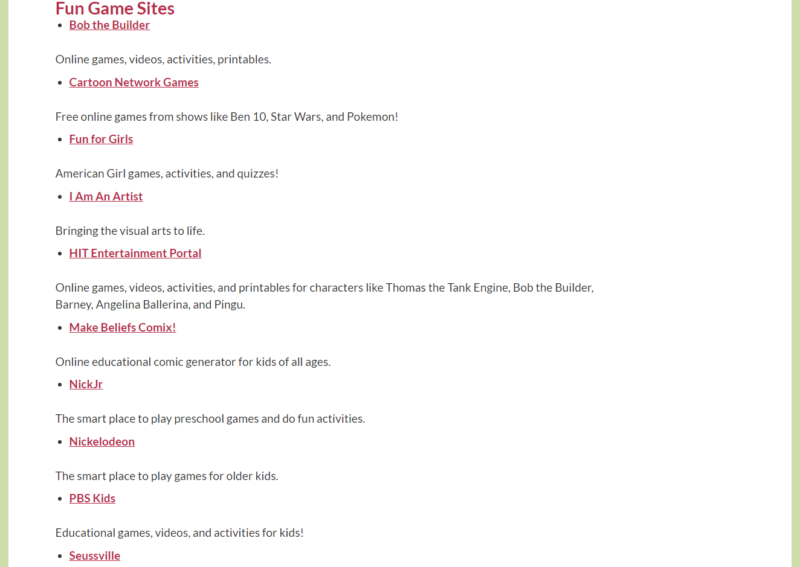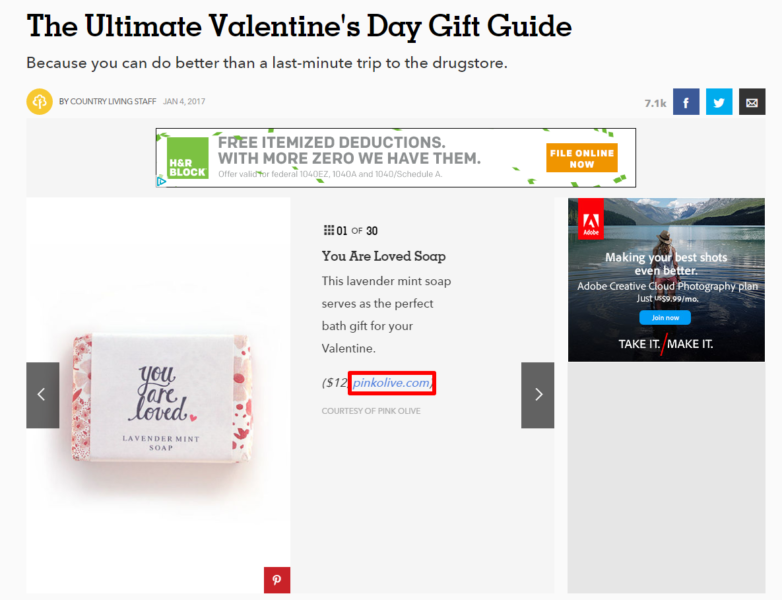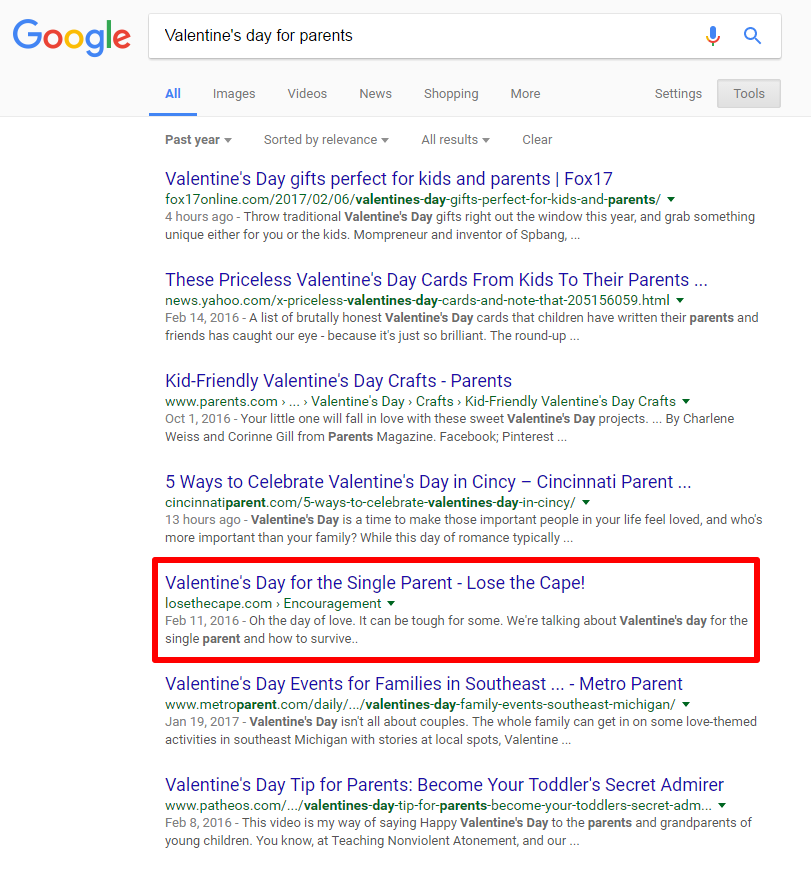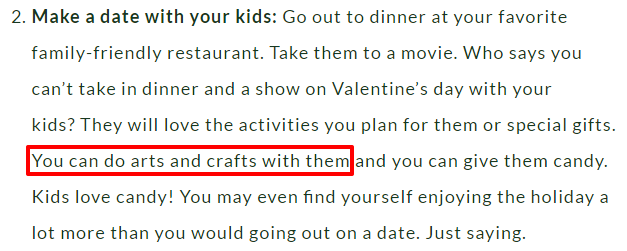Seasonal and holiday link building
It's not too early to start thinking about Valentine's Day 2018! Columnist Andrew Dennis explains how to structure a link-building campaign for success during crucial seasonal periods and provides an outline for preparing 12 months in advance.
Seasonal traffic trends have a tremendous impact on websites, and businesses need to take full advantage of the traffic spikes surrounding specific seasons and holidays — particularly those that are relevant to their products and services.
For example, with Google Trends, we can see interest in the term “Valentine’s Day gifts” spikes, unsurprisingly, around Valentine’s Day:
Interest begins building in early January and then drastically falls off after Valentine’s Day, around February 16. Websites that sell Valentine’s Day gifts would surely want to be aware of and prepared for these periods of boosted interest.
Of course, taking advantage of these surges in interest requires ongoing work throughout the year. You need to launch your link campaign long before a holiday to reap the rewards when interest peaks.
At Page One Power, we often have prospects contact us asking to start a link campaign one month before a major holiday, in hopes of securing more traffic and conversions. We have to explain that the campaign would be better served preparing for next year, because one month is not enough lead time to make a meaningful impact on their brand’s visibility.
Securing the right links can help your website benefit from spikes in interest during specific holidays or seasons, but those links need time to influence your site’s organic search rankings prior to the spikes. You can’t spam your way to the top with thousands of manipulative links in short order (Penguin now devalues those links in real time); you need to consistently secure worthwhile links over the long term to achieve sustained organic visibility.
Today, I’ll demonstrate how to build links to seasonal keyword pages and be prepared for traffic surges during important holidays and seasons.
An example timeline for seasonal link campaigns
With it being Valentine’s Day, I want to focus on a website that sells popular Valentine’s Day gifts.
For my example, I will use Build-a-Bear, which (at the time of writing this post) ranks on page 10 for the search phrase “valentine’s day gifts.” Using Google Trends again, I see Valentine’s Day is Build-a-Bear’s second most important holiday (behind Christmas) in terms of traffic:
If Build-a-Bear were able to improve their organic visibility during Valentine’s Day, it stands to reason they could secure more qualified traffic and conversions.
I’ll lay out a timeline for a hypothetical seasonal link strategy that Build-a-Bear could execute to earn more visibility during Valentine’s Day.
Twelve months before Valentine’s Day
Twelve months out from Valentine’s Day, Build-a-Bear is no doubt recovering from and celebrating another successful year.
They should take a well-deserved moment to congratulate themselves — but they shouldn’t rest on their laurels for long.
Although it’s too early to implement strategies focused on Valentine’s Day, Build-a-Bear should work to secure links that grow their overall brand visibility. Growing overall visibility and authority in search puts Build-a-Bear in a position to secure more traffic during the important Valentine’s Day season.
Example opportunity
Build-a-Bear has a number of well-developed, free games to play on their website.
These games are excellent linkable assets because they offer value (fun to play) to the audience of youngsters who would happily play them.
A quick Google search for “free online games for kids database” returns some promising link opportunities:
Both of these opportunities are library websites — and great link prospects for Build-a-Bear.
The first link returns a 404 (although there is a relevant opportunity here), so I’ll highlight the second listing instead. Clicking the link takes me to this page:
Under the header “Websites for Kids,” I see a link titled “Fun Game Sites,” which looks relevant to Build-a-Bear’s games page. Clicking the link, I’m taken to the game sites section:
Glancing through the sites listed here, I can see this is a relevant place for Build-a-Bear to have a link. This is a perfect example of the types of links Build-a-Bear should be pursuing outside of their seasonal Valentine’s Day strategy.
Six months before Valentine’s Day
Six months out from Valentine’s Day is an ideal time to start developing new Valentine’s-themed assets or marketing initiatives.
Of course, link acquisition strategies targeting branded terms and broader keywords and themes should continue, but as Valentine’s Day approaches, Build-a-Bear may want to allocate some resources to preparation for the holiday.
As Build-a-Bear begins to create fresh, holiday-themed content, they should identify potential link opportunities for their existing Valentine’s Day-themed content and products.
Example opportunity
Build-a-Bear has an extensive collection of Valentine’s Day gifts they should promote around Valentine’s Day. To find potential link opportunities six months before Valentine’s Day, they can examine Valentine’s Day content from last year.
For example, Googling “Valentine’s Day 2016 gift guide” reveals a number of high-profile websites that published articles with gift ideas for Valentine’s Day:
These guides feature Valentine’s Day gift ideas, with links to the corresponding products. Such as this example from Country Living:
These lists would be ideal link opportunities for Build-a-Bear. They should contact these publishers early, before they publish new content around Valentine’s Day, and inform them about Build-a-Bear’s gifts. That would greatly increase their chances of being featured, and perhaps allow them to build a partnership.
Three months before Valentine’s Day
Three months out from Valentine’s Day is when Build-a-Bear should be securing link opportunities for their Valentine’s-themed content and products.
Now that Build-a-Bear has created their own Valentine’s Day content, they need to promote that content and take advantage of the unique opportunities that appear close to Valentine’s Day.
Example opportunity
Build-a-Bear has done a nice job creating some quality Valentine’s Day content in the past, so I’ll use that content for this example.
This blog post about crafting homemade valentines with your kids is an ideal example:
This post is a helpful resource for parents looking for tips on how to make Valentine’s Day special for their children and would be relevant to any site that discusses this topic.
I can find sites interested in this resource by searching “Valentine’s Day for Parents” and using the search tools to filter results for the past year.
Scanning through the results, I find a potential link opportunity on page three:
Clicking on the post, it looks like a nice opportunity, as the article discusses spending time with your children on Valentine’s Day:
The post even specifically mentions crafting with your kids:
Build-a-Bear should reach out to this author and ask her to link to their resource, as it would add value to her article and be helpful to her audience.
The three-month mark is a good time to pitch guest contributions (if that’s part of your strategy) to publishers as well. Highlighting trends and seasonal traffic spikes will make your themed pitch more compelling.
Since Build-a-Bear has invested in creating Valentine’s Day-themed content, they should also invest in promoting that content.
Post-Valentine’s Day
After the holiday comes and goes, your link campaign should shift back to a more comprehensive, broader strategy.
Of course, if your business ran any seasonal marketing or PR campaigns, there is still opportunity to secure links from the coverage these campaigns generated. Don’t settle for mentions — convert those mentions into links.
For example, here is an unlinked mention where Build-a-Bear should earn a link:
This coverage came from a local Build-a-Bear sponsored charity event they host every year. A link to the corresponding store’s page would be relevant and helpful to users, as it includes directions on how to get to the store.
After exhausting the remaining link opportunities from Valentine’s Day, Build-a-Bear can continue securing relevant links with other strategies, such as broader brand visibility strategies, other holiday-specific products, or maybe strategies focusing on their partnered products, such as their DreamWorks Trolls products, NFL licensed products. Regardless of the specific strategy, Build-a-Bear can follow a similar timeline for effective link acquisition.
Certain link opportunities can be seasonal, but link building as a strategy is constant — to take full advantage of seasonal traffic trends, you must secure worthwhile links year-round.
Contributing authors are invited to create content for Search Engine Land and are chosen for their expertise and contribution to the search community. Our contributors work under the oversight of the editorial staff and contributions are checked for quality and relevance to our readers. The opinions they express are their own.
Related stories


